Trumpilla on mahdollisuus tyriä varsin turhanpäiväise
https://yle.fi/uutiset/3-9961200
Miksi Jerusalem on niin tärkeä? Viisi kysymystä pyhän kaupungin asemasta ja sen merkityksestä
Yhdysvaltain presidentin Donald Trumpin uumoillaan tunnustavan tällä viikolla Jerusalemin Israelin pääkaupungiksi. Se on jo etukäteen myllertänyt mielipiteitä Lähi-idässä. Me kerromme miksi.
4.12.2017 klo 20:26
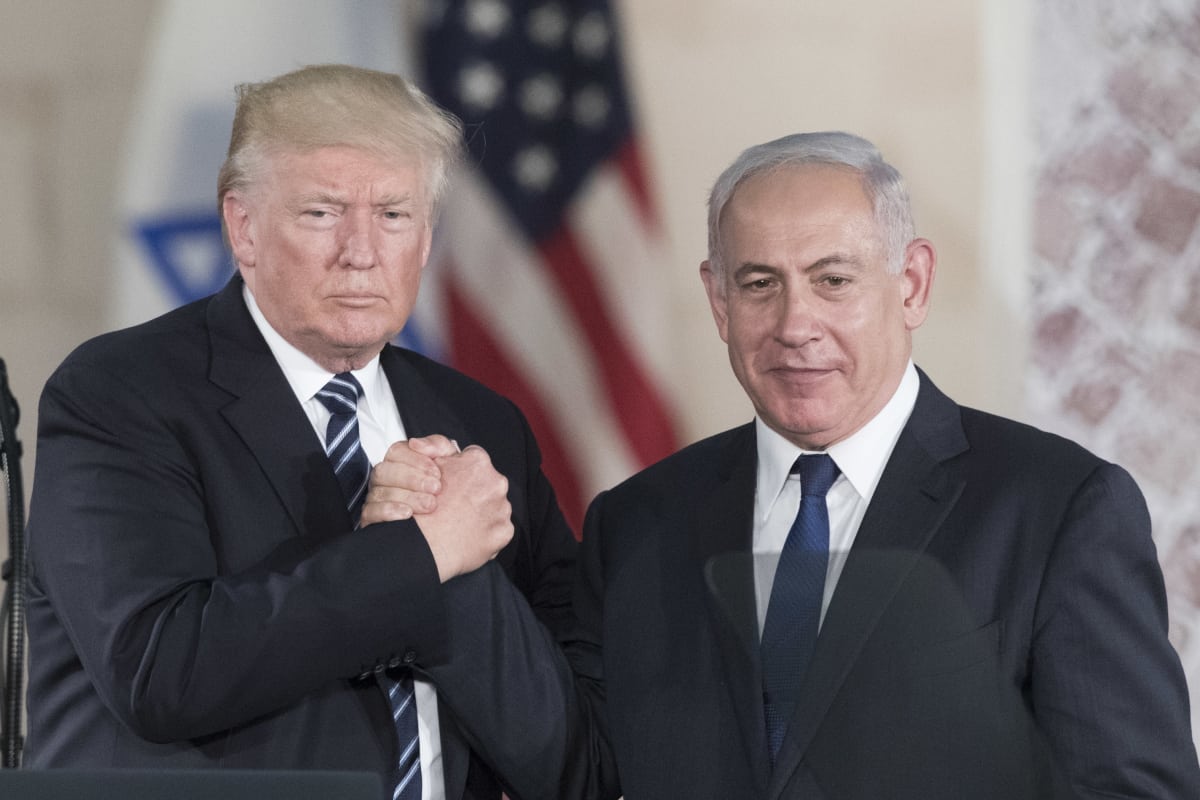
Presidentti Donald Trumpin uskotaan pitävän keskiviikkona puheen, jossa hän tunnustaa Jerusalemin Israelin pääkaupungiksi. Hänen odote- taan silti säilyttävän Yhdysvaltain suurlähetystön toistaiseksi Tel Avivissa.
Trump lupasi vaalikampanjassaan siirtää lähetystönkin Jerusalemiin. Presidenttinä hän haluaa myös edistää Lähi-idän rauhanneuvotteluita, ja siksi empii voimakkaita liikkeitä.
Yhdysvaltain kongressi päätti jo vuonna 1995 siirrosta, mutta eri presidentit ovat lykänneet sitä tähän asti puolen vuoden välein annettavalla asetuksella. Myös Trump allekirjoitti lykkäyspäätöksen 1. kesäkuuta, uusi päätös pitäisi allekirjoittaa tänään maanantaina.
Israelin mielestä jakamaton Jerusalem on sen pääkaupunki. Israelin par- lamentti ja ministeriöt sijaitsevat Jerusalemissa. Kaupunki ja erityisesti sen Temppelivuori on juutalaisille uskonnollisesti merkittävä paikka.
Kaupungissa asuu liki 900 000 asukasta, joten se on selvästi Israelin suurin kaupunki, kaksi kertaa Tel Avivin kokoinen.
Jerusalemille suunniteltiin erillisasemaa YK:n alaisuudessa YK:n Palestii- naa koskevassa jakosuunnitelmassa 1947. Vuoden 1948–49 sodassa Israel valloitti kaupungin länsiosat ja Jordania itäosat.
Vuoden 1967 kuuden päivän sodassa Israel valtasi – Länsirannan, Gazan alueen ja Siinain ohella – palestiinalaisten asuttaman Itä-Jerusalemin. Kansainvälinen yhteisö ei tunnusta kaupungin kuuluvan kokonaisuudessaan Israelille.
1) Mitä Israel tekee Itä-Jerusalemissa?
Israel on jo vuosia pyrkinyt sinetöimään kaupungin omakseen muun muassa rakentamalla voimakkaasti kaupungin ympärille ja Itä-Jerusalemiin. Itä-Jerusalemin palestiinalaisten asemaa on puolestaan hankaloitettu monin eri tavoin.
Hallituksen toimia kritisoiva israelilainen ihmisoikeusjärjestö B´Tselem kertoo, että Israel on vuoden 1967 jälkeen pakkolunastanut yli kolmasosan Jerusalemiin liitetyistä alueista. Maat on pakkolunastettu pääosin palestiinalaisilta ja niille on rakennettu juutalaisille asukkaille toistakymmentä lähiötä.
Itä-Jerusalemiin on kaavoitettu paljon rakentamiskiellossa olevia puistoalueita, ja B’tselem arvioi, että vain noin 15 prosenttia palestiinalaisten asuttamista alueista on kaavoitettu asumiskäyttöön.
Rakennuslupien saaminen on hyvin vaikeaa. Sen seurauksena palestiinalaiset asuvat noin puolet ahtaammin kuin juutalaiset. Samaan aikaan juutalaisia siirtokuntalaisia on B’tselemin mukaan jopa kannustettu asettumaan Itä-Jerusalemin palestiinalaiskortteleihin, siirtokuntalaisia on liki kolme tuhatta.
Itä-Jerusalem on myös erotettu muista palestiinalaisalueista vuonna 2016 valmistuneella muurilla. Kymmeniä tuhansia palestiinalaisia jäi muurin ulkopuolelle, vaikka heidän asuinalueensa kuuluu kaupunkiin ja he maksavat kunnallisveroa Jerusalemiin.
Itä-Jerusalemin palestiinalaisilla ei ole kansalaisoikeuksia vaan pysyvä asumisoikeus. Se oikeuttaa asumaan ja työskentelemään Itä-Jerusalemissa, mutta ei esimerkiksi äänestämään valtiollisissa vaaleissa. Asumisoikeuden saaminen vaikkapa Länsirannalta naidulle puolisolle on käytännössä liki mahdotonta.
Jerusalemin kaupungin tarjoamissa palveluissa on räikeä epäsuhta. Esimerkiksi vain puolet palestiinalaisista on saanut kunnalta vesiliittymän.
Kaikki tämä on kiristänyt jännitteitä Itä-Jerusalemissa
2) Mitä kansainvälinen laki sanoo Jerusalemin asemasta?
YK:n turvallisuusneuvosto hyväksyi vuosi sitten päätöslauselman 2334, jonka mukaan rajamuutoksia ei tunnisteta, vaan kuuden päivän sotaa edeltävät rajat ovat yhä voimassa. Niistä voidaan poiketa vain neuvotteluteitse.
Näin ollen YK:n näkökulmasta Israel miehittää Itä-Jerusalemia, eikä palestiinalaisalueiden asuttamista juutalaisilla hyväksytä. Israelia vaaditaan lopettamaan asutustoiminta palestiinalaisalueille, myös Itä-Jerusalemiin.
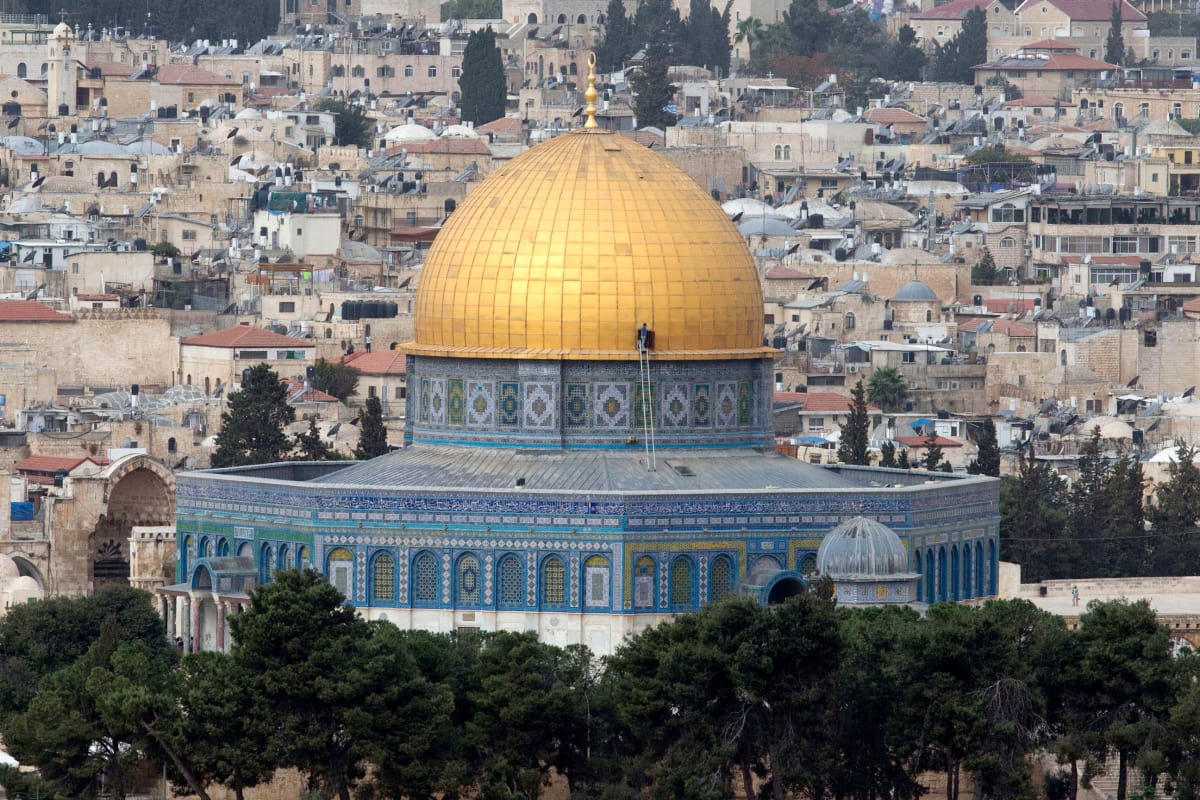
Jos Trump tunnustaa jakamattoman Jerusalemin Israelin pääkaupungiksi, Yhdysvaltain katsotaan puolustavan Israelia rauhanneuvotteluissa. Palestiinalaishallinnon presidentin, Mahmud Abbasin tiedottaja sanoi viikonloppuna, että tunnustus ravisuttaisi koko aluetta ja päättäisi rauhanprosessiin palestiinalaishallinnon ja Israelin välillä.
5) Miten muut arabimaat suhtautuvat?
Alueen muut arabimaat tukevat palestiinalaishallintoa. Palestiinalais- hallinnon presidentti Abbas neuvotteli viikonlopun aikana seitsemän alueen valtionpäämiehen kanssa keinoista estää Trumpin tunnustus.
Viime viiikolla Washingtonissa vieraillut Jordanian kuningas Abdullah II ja Arabiliiton pääsihteeri Ahmed Aboul Gheit varoittavat, että tunnustus olisi vakava provokaatio ja saattaisi lietsoa terrorismia.
Lähi-idän tutkijat varoittavat, että vaikka presidentti Trump konsultoisi kuinka perusteellisesti tahansa alueen valtionpäämiehiä, jakamattoman Jerusalemin katsominen Israelin pääkaupungiksi aiheuttaisi vastareaktion.
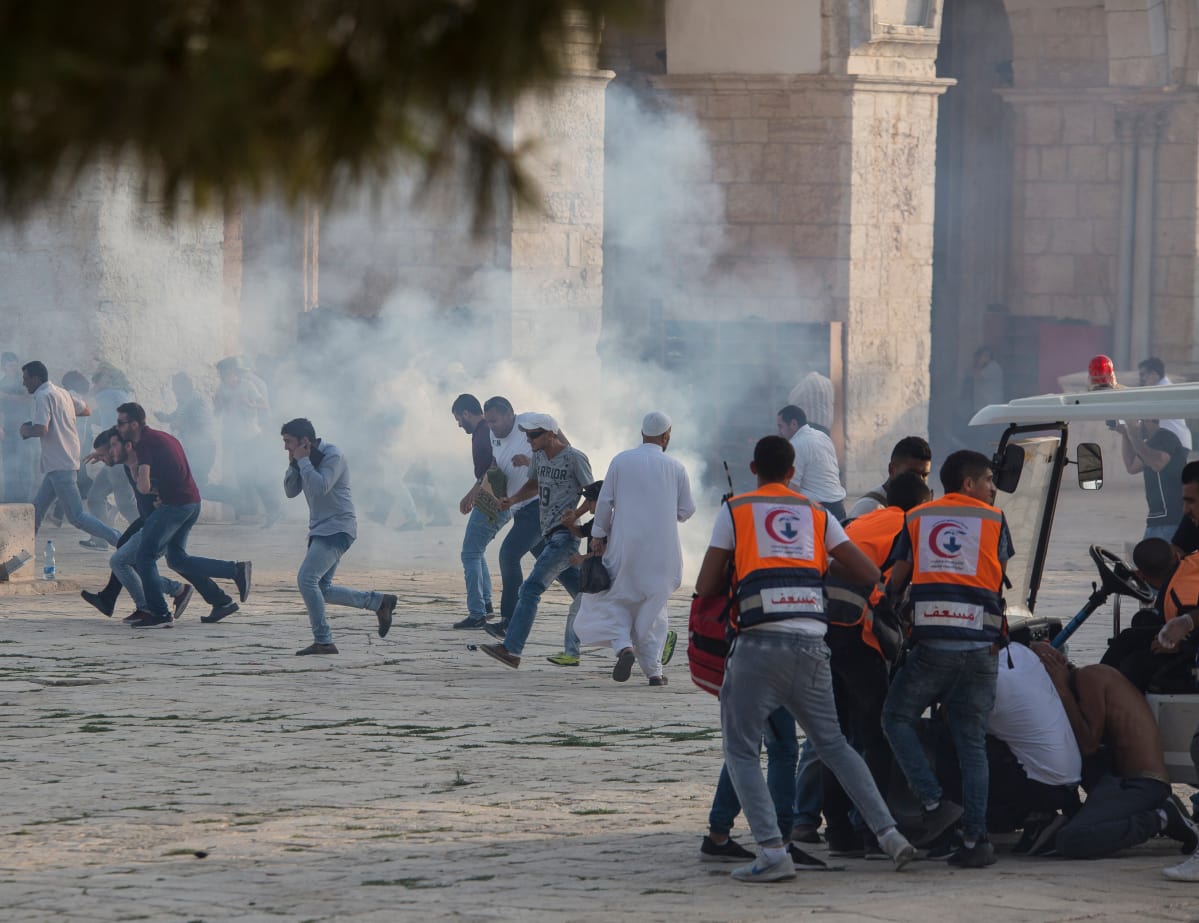
– Ongelmat piilevät Trumpin ilmoituksen yksityiskohdissa, arvioi Martin S. Indyk New York Timesille. Indyk toimi Yhdysvaltain suurlähettiläänä Israelissa presidentti Bill Clintonin aikana.
– Jos päätöstä ei muotoilla huolellisesti, se ei todellakaan ratkaise ongelmia, vaan pudottaa hallinnon yhä kuumempaan veteen, sanoi Indyk.
Indykin mukaan päätöksessä on olennaista se, rajoittaako Trump tunnustuksen Länsi-Jerusalemiin, mainitseeko hän palestiinalaisten Itä-Jerusalemia koskevia vaatimuksia ja miten hän käsittelee Jerusalemin asemaa pyhänä kaupunkina. Viimeksi mainittu on tärkeää muun muassa Saudi-Arabialle.
Lue lisää aiheesta: Pudottaako Trump uutispommin Jerusalemiin?
Jerusalemin asemasta määrää YK:nYleikokouksen Palestiinan jakopäätös 29.11.1947.
Turvallisuusneuvosto on sidottu tämän päätöksen linjaan. Yleiskous voi muuttaa sitä Turvallisuusneuvoston esityksestä (koska kriisi on päällä, asia on tavallaan aina TN:n pöydällä).
https://en.wikisource.org/wiki/United_Nations_General_Assembly_Resolution_181
” C. THE CITY OF JERUSALEM
The boundaries of the City of Jerusalem are as defined in the recommendations on the City of Jerusalem. (See Part III, section B, below).
Part III. – City of Jerusalem (5)
A. SPECIAL REGIME
The City of Jerusalem shall be established as a corpus separatum under a special international regime and shall be administered by the United Nations. The Trusteeship Council shall be designated to discharge the responsibilities of the Administering Authority on behalf of the United Nations.
B. BOUNDARIES OF THE CITY
The City of Jerusalem shall include the present municipality of Jerusa- lem plus the surrounding villages and towns, the most eastern of which shall be Abu Dis; the most southern, Bethlehem; the most western, ’Ein Karim (including also the built-up area of Motsa); and the most northern Shu’fat, as indicated on the attached sketch-map (annex B).
C. STATUTE OF THE CITY
The Trusteeship Council shall, within five months of the approval of the present plan, elaborate and approve a detailed statute of the City which shall contain, inter alia, the substance of the following provisions:
- Government machinery; special objectives. The Administering Authority in discharging its administrative obligations shall pursue the following special objectives:
- To protect and to preserve the unique spiritual and religious interests located in the city of the three great monotheistic faiths throughout the world, Christian, Jewish and Moslem; to this end to ensure that order and peace, and especially religious peace, reign in Jerusalem;
- To foster cooperation among all the inhabitants of the city in their own interests as well as in order to encourage and support the peaceful development of the mutual relations between the two Palestinian peoples throughout the Holy Land; to promote the security, well-being and any constructive measures of development of the residents having regard to the special circumstances and customs of the various peoples and communities.
Governor and Administrative staff. A Governor of the City of Jerusa- lem shall be appointed by the Trusteeship Council and shall be responsible to it. He shall be selected on the basis of special qualifications and without regard to nationality. He shall not, however, be a citizen of either State in Palestine. The Governor shall represent the United Nations in the City and shall exercise on their behalf all powers of administration, including the conduct of external affairs. He shall be assisted by an administrative staff classed as international officers in the meaning of Article 100 of the Charter and chosen whenever practicable from the residents of the city and of the rest of Palestine on a non-discriminatory basis. A detailed plan for the organization of the administration of the city shall be submitted by the Governor to the Trusteeship Council and duly approved by it.
3. Local autonomy
- The existing local autonomous units in the territory of the city (villages, townships and municipalities) shall enjoy wide powers of local government and administration.
- The Governor shall study and submit for the consideration and decision of the Trusteeship Council a plan for the establishment of special town units consisting, respectively, of the Jewish and Arab sections of new Jerusalem. The new town units shall continue to form part the present municipality of Jerusalem.
Security measures
- The City of Jerusalem shall be demilitarized; neutrality shall be declared and preserved, and no para-military formations, exercises or activities shall be permitted within its borders.
- Should the administration of the City of Jerusalem be seriously obstructed or prevented by the non-cooperation or interference of one or more sections of the population the Governor shall have authority to take such measures as may be necessary to restore the effective functioning of administration.
- To assist in the maintenance of internal law and order, especially for the protection of the Holy Places and religious buildings and sites in the city, the Governor shall organize a special police force of adequate strength, the members of which shall be recruited outside of Palestine. The Governor shall be empowered to direct such budgetary provision as may be necessary for the maintenance of this force.
Legislative Organization.
A Legislative Council, elected by adult residents of the city irrespective of nationality on the basis of universal and secret suffrage and proportional representation, shall have powers of legislation and taxation. No legislative measures shall, however, conflict or interfere with the provisions which will be set forth in the Statute of the City, nor shall any law, regulation, or official action prevail over them. The Statute shall grant to the Governor a right of vetoing bills inconsistent with the provisions referred to in the preceding sentence. It shall also empower him to promulgate temporary ordinances in case the Council fails to adopt in time a bill deemed essential to the normal functioning of the administration.
Administration of Justice.
The Statute shall provide for the establishment of an independent judiciary system, including a court of appeal. All the inhabitants of the city shall be subject to it.
Economic Union and Economic Regime.
The City of Jerusalem shall be included in the Economic Union of Palestine and be bound by all stipulations of the undertaking and of any treaties issued therefrom, as well as by the decisions of the Joint Economic Board. The headquarters of the Economic Board shall be established in the territory City. The Statute shall provide for the regulation of economic matters not falling within the regime of the Economic Union, on the basis of equal treatment and non-discrimination for all members of thc United Nations and their nationals.
Freedom of Transit and Visit: Control of residents.
Subject to considerations of security, and of economic welfare as determined by the Governor under the directions of the Trusteeship Council, freedom of entry into, and residence within the borders of the City shall be guaranteed for the residents or citizens of the Arab and Jewish States. Immigration into, and residence within, the borders of the city for nationals of other States shall be controlled by the Governor under the directions of the Trusteeship Council.
Relations with Arab and Jewish States.
Representatives of the Arab and Jewish States shall be accredited to the Governor of the City and charged with the protection of the interests of their States and nationals in connection with the international administration of thc City.
Official languages.
Arabic and Hebrew shall be the official languages of the city. This will not preclude the adoption of one or more additional working languages, as may be required.
Citizenship.
All the residents shall become ipso facto citizens of the City of Jerusalem unless they opt for citizenship of the State of which they have been citizens or, if Arabs or Jews, have filed notice of intention to become citizens of the Arab or Jewish State respectively, according to Part 1, section B, paragraph 9, of this Plan. The Trusteeship Council shall make arrangements for consular protection of the citizens of the City outside its territory.
Freedoms of citizens
- Subject only to the requirements of public order and morals, the inhabitants of the City shall be ensured the enjoyment of human rights and fundamental freedoms, including freedom of conscience, religion and worship, language, education, speech and press, assembly and association, and petition.
- No discrimination of any kind shall be made between the inhabitants on the grounds of race, religion, language or sex.
- All persons within the City shall be entitled to equal protection of the laws.
- The family law and personal status of the various persons and communities and their religious interests, including endowments, shall be respected.
- Except as may be required for the maintenance of public order and good government, no measure shall be taken to obstruct or interfere with the enterprise of religious or charitable bodies of all faiths or to discriminate against any representative or member of these bodies on the ground of his religion or nationality.
- The City shall ensure adequate primary and secondary education for the Arab and Jewish communities respectively, in their own languages and in accordance with their cultural traditions.
The right of each community to maintain its own schools for the education of its own members in its own language, while conforming to such educational requirements of a general nature as the City may impose, shall not be denied or impaired. Foreign educational establishments shall continue their activity on the basis of their existing rights.
- No restriction shall be imposed on the free use by any inhabitant of the City of any language in private intercourse, in commerce, in religion, in the Press or in publications of any kind, or at public meetings.
Holy Places
- Existing rights in respect of Holy Places and religious buildings or sites shall not be denied or impaired.
- Free access to the Holy Places and religious buildings or sites and the free exercise of worship shall be secured in conformity with existing rights and subject to the requirements of public order and decorum.
- Holy Places and religious buildings or sites shall be preserved. No act shall be permitted which may in any way impair their sacred character. If at any time it appears to the Governor that any particular Holy Place, religious building or site is in need of urgent repair, the Governor may call upon the community or communities concerned to carry out such repair. The Governor may carry it out himself at the expense of the community or communities concerned if no action is taken within a reasonable time.
- No taxation shall be levied in respect of any Holy Place, religious building or site which was exempt from taxation on the date of the creation of the City. No change in the incidence of such taxation shall be made which would either discriminate between the owners or occupiers of Holy Places, religious buildings or sites or would place such owners or occupiers in a position less favourable in relation to the general incidence of taxation than existed at the time of the adoption of the Assembly’s recommendations.
Special powers of the Governor in respect of the Holy Places, religious buildings and sites in the City and in any part of Palestine.
-
- The protection of the Holy Places, religious buildings and sites located in the City of Jerusalem shall be a special concern of the Governor.
- With relation to such places, buildings and sites in Palestine outside the city, the Governor shall determine, on the ground of powers granted to him by the Constitution of both States, whether the provisions of the Constitution of the Arab and Jewish States in Palestine dealing therewith and the religious rights appertaining thereto are being properly applied and respected.
- The Governor shall also be empowered to make decisions on the basis of existing rights in cases of disputes which may arise between the different religious communities or the rites of a religious community in respect of the Holy Places, religious buildings and sites in any part of Palestine.
In this task he may be assisted by a consultative council of representatives of different denominations acting in an advisory capacity.
D. DURATION OF THE SPECIAL REGIME
The Statute elaborated by the Trusteeship Council the aforementioned principles shall come into force not later than 1 October 1948. It shall remain in force in the first instance for a period of ten years, unless the Trusteeship Council finds it necessary to undertake a re-examination of these provisions at an earlier date. After the expiration of this period the whole scheme shall be subject to examination by the Trusteeship Council in the light of experience acquired with its functioning. The residents the City shall be then free to express by means of a referendum their wishes as to possible modifications of regime of the City.
Part IV. Capitulations
States whose nationals have in the past enjoyed in Palestine the privileges and immunities of foreigners, including the benefits of consular jurisdiction and protection, as formerly enjoyed by capitulation or usage in the Ottoman Empire, are invited to renounce any right pertaining to them to the re-establishment of such privileges and immunities in the proposed Arab and Jewish States and the City of Jerusalem.
-
-
- Adopted at the 128th plenary meeting:
-
In favour: 33
Australia, Belgium, Bolivia, Brazil, Byelorussian S.S.R., Canada, Costa Rica, Czechoslovakia, Denmark, Dominican Republic, Ecuador, France, Guatemala, Haiti, Iceland, Liberia, Luxemburg, Netherlands, New Zealand, Nicaragua, Norway, Panama, Paraguay, Peru, Philippines, Poland, Sweden, Ukrainian S.S.R., Union of South Africa, U.S.A., U.S.S.R., Uruguay, Venezuela.
Against: 13
Afghanistan, Cuba, Egypt, Greece, India, Iran, Iraq, Lebanon, Pakistan, Saudi Arabia, Syria, Turkey, Yemen.
Abstained: 10
Argentina, Chile, China, Colombia, El Salvador, Ethiopia, Honduras, Mexico, United Kingdom, Yugoslavia.
Notes:
(1) See Official Records of the General Assembly, Second Session Supplement No. 11,Volumes l-lV.
- At its hundred and twenty-eighth plenary meeting on 29 November 1947 the General Assembly, in accordance with the terms of the above resolution, elected the following members of the United Nations Commission on Palestine: Bolivia, Czechoslovakia, Denmark, Panama, and Philippines.
(2) This resolution was adopted without reference to a Committee.
(3) The following stipulation shall be added to the declaration concerning the Jewish State: ”In the Jewish State adequate facilities shall be given to Arabic-speaking citizens for the use of their language, either orally or in writing, in the legislature, before the Courts and in the administration.”
(4) In the declaration concerning the Arab State, the words ”by an Arab in the Jewish State” should be replaced by the words ”by a Jew in the Arab State.”
(5) On the question of the internationalization of Jerusalem, see also General Assembly resolutions 185 (S-2) of 26 April 1948; 187 (S-2) of 6 May 1948, 303 (lV) of 9 December 1949, and resolutions of the Trusteeship Council (Section IV). ”
Tähän asti pahin ulkopoliittinen Trumpilta: jatkaa YK:n nakertamista.
Trump tunnusti Jerusalemin Israelin pääkaupungiksi – Lähi-itä pelkää levottomuuksia
Kansainvälinen yhteistö varoitti USA:ta etukäteen tunnustaminen vaaroista.
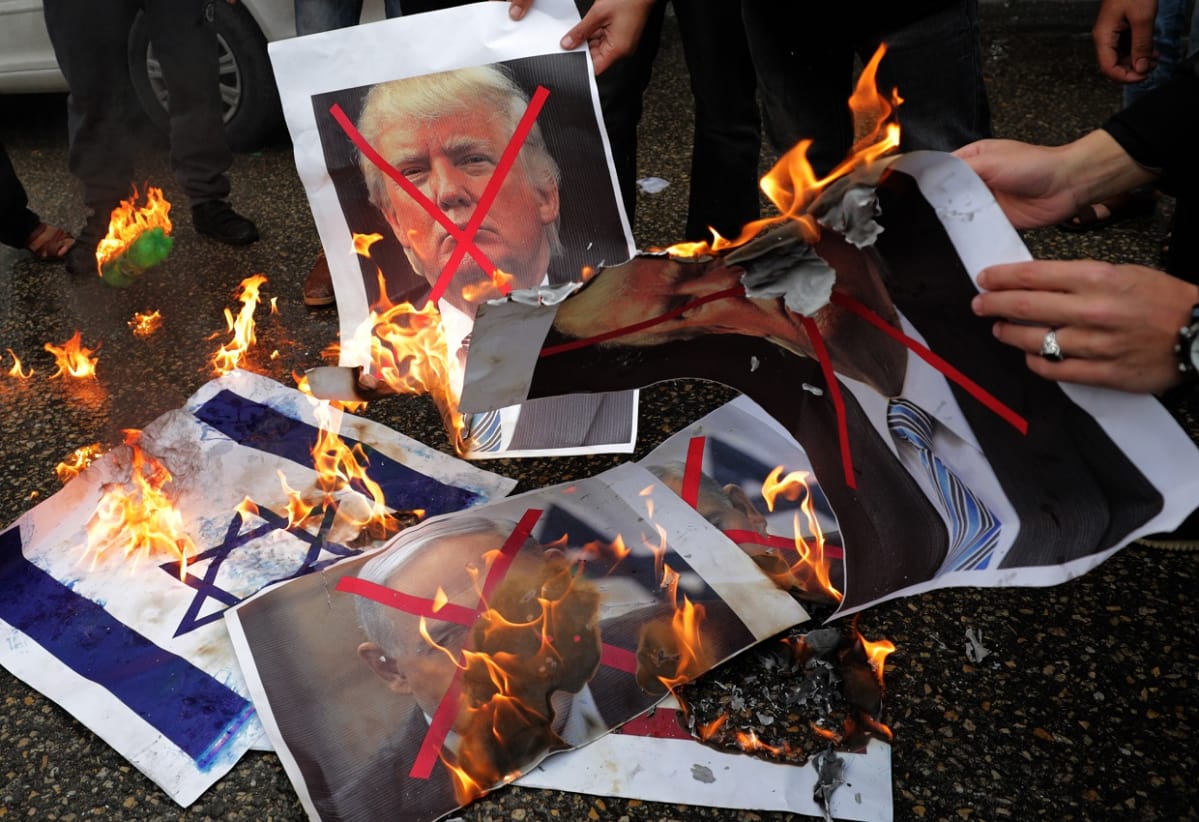
Jouni Suninen listaa keskeiset valeet kansainvälistä oikeutta koskien Jerusalemisssa: näitä ovat
a) että koko Palestiina olisi joskus jossakin kansaisnväien lain voimeisessa oelimessä ”Luvattu juutalaisten kansalliseksi kotimaaksi”. EI ole.
b) että ”arabinaapurit olsivat vallanneet v. 1948 Isralille kuuluvia alueita.
c) että jokin ”maaginen Palestiinan mandaatti” olisi voimassa, mutta YK:n Plestiinan jakopäätös 29.11.1947 ”olisi peruutettu”.
e) että Jodaniakin olisi ollut PALESTIINAN MANDAATTIALUETTA: ei ollut, vaan omaansa: erilait eri säädökset eri päämäärät, eri kansa (beduiinit).
f) että Isralein miehitys Plestiinan arabivaltiossa olisi ”laillinen”.
g) että YK:n Yleiskouksen lakipäätöslauselmat eivät olsi velvoittavia: kyllä ovat vevoittavia mm. Turvallisuusneuvostolle ja Sihteeristölle ja YK-tuomioistuimille kategorisesti ja kansallisvaltiolle kehotuksena viedä kansalliseen lakiin päätös sinne soveltuvalla tavalla.
http://vekotin.puheenvuoro.uusisuomi.fi/247283-voiko-olematon-rauha-kadota#comment-3717445
Jouni Suninen:
” Yhdysvaltain kongressi tosiaan tunnusti jo vuonna 1995 Jerusalemin Israelin pääkaupungiksi. Jerusalem Embassy Act hyväksyttiin senaatissa (93–5) ja edustajainhuoneessa (374–37). Trump vahvisti lain. Tähän ehkä vaikutti se, että Jerusalem ei ole koskaan ollut muiden valtioiden kuin Israelin pääkaupunki. Valloitettu se ajoittain on ollut. ”
RK: Trump tunnusti, Kongressi korkeintaan oli valtuuttanut. Tunnustaminen tai tunnutuksen peruuttaminen vaatii suurin piirtein samanlaiset valtuudet kuin sodanjulistua (joka peruuttaa diplomaattisuhteet ja siten tunnustuksenkin) tai rauhanteko.
JS: ” Hieman ennen nykyisen ajanlaskumme alkua Jerusalem joutui roomalaisvallan alaiseksi. Roomalaisten menetettyä otteensa Palestiinassa, Jerusalem joutui monenlaisten miehittäjien haltuun. Ottomaanien Turkki valloitti Palestiinan vuosiksi 1517 – 1917. Iso-Britannia valtasi Palestiinan Turkilta v.1917 ja teki siitä mandaatin jonka Kansainliitto vahvisti. Mandaatti perustettiin juutalaisten kansalliseksi kodiksi. ”
EI PERUSTETTU! Kansiliitto edellytti mandaattorilta tasapuolisuutta väestöryhmiä kohtaan.
Jo Brittiläinen Palestiinan mandaattihallinto päätti Palestiinan jakamisesta juutalais- ja arabivaltioiksi. Sen (Peelin momission) kaavailema Palestiinan juutalaisvaltio oli huomattavasti pienempi kuin YK:n 29.11.1947 PL 181:llä tunnustama, ja sen olisi lisäksi pitänyt kuulua Brittiläiseen kansainyhteisöön, mahdollisesti jopa tunnustaa engöannin kuningas muodolliseksi valtiopäämieheksi.
JS: ” Jerusalem sisältyi siihen jakamattomana. ”
RK EI sisältynyt, vaan oli YK:n erityishallinta-alueena kuten nytkin. Alue olttui Jerusalemista rannikolle eräänalisena käytävänä.
JS: ” Samaan aikaan Lähi-idän arabiheimot saivat omat mandaattinsa, joista syntyivät Libanonin, Syyrian, Irakin ja Jordanian valtiot. ”
RK: Juu, saivat. Nuo olvat eri mandaatit.
JS: ” Vuonna 1948 Israelin valtio syntyi uudestaan historialliselle paikalleen. ”
RK: SE syntyi PL 181:n määräämälle paikalle.
Se yritti kuitenkin heti kaapata laittomasti myös Palestiinan arbivaltion
Mandaattori Englannin komentamat tämän siirtomaa Egypti ja mandaattialue Jordania asettuivat puolustamaan, ja tilanteen pakosta myös miehittämään, mandaattorin antamalla lailisuudella palestiinan arabivaltiota. Beduiinialueet Haifasta pohjoiseen ja Gazasta etelään liittyivät kuitenkin Israeliin (mikä oli omasta tahdosta päätöslauselman mukaan laillista.
Israel sai siis kuitenkin alkuperäistä päätöstä SUUREMMAN alueen.
JS: ” Mandaatin muut osat jäivät juridisesti ennalleen. ”
RK: Palestiina madaattialue jaettiin. Muut mandaatit eivät liity tähän. Ne itsenäistyivät aikanaan kuten Egyptikin.
JS: ” Ainoat Palestiinan jakoa koskevat juridisesti velvoittavat kansainväliset sopimukset ovat vuoden 1920 San Remon konventio ja Palestiinan vuoden 1922 mandaatti. ”
RK: Paskat: San Remon sopimus oli Englannin, Ranskan ja Turkin ETUPIIRISOPIMUS, jolla ei ole tämän asian laillisuuden kanssa MITÄÄN TEKEMISTÄ!
YK:n PL 181 korvaa Palestiinan mandaatin, ja määrsi myös yksityiskohtaisesti sen lakkauttamisesta. Tosin se mandaatti sillä lakannut, koska sen velvoitteita ei ollut hoidettu loppuun juuri PAV:n itsenäistymisen osalta.
JS: ” YK:n yleiskokouksen päätöslauselmat eivät ole oikeudellisesti sitovia. ”
Viittaan ylle ja YK:n Peruskirjaan.
Sen ”Sahtivaarin-suomennoksista” ei tarvitse välittää: vain englannin-, ranskan-, espanjan-, venäjän-, arabian- ja kiinankieliset käännöket ovat laillisia, keskenään tasavertaisia.
JS: ” Turvallisuusneuvoston päätökset taas eivät voi kumota Kansainliiton aikoinaan vahvistamia sopimuksia, ellei YK:n peruskirjaa muuteta. ”
YK:n lait voivat kumota Kansinliiton lait, mutta sellaiset niistä, joita ei ole erkseen kumottu, ovat voimassa YK:n lakien tapaan kehutusluonteina kansainvälisen laillisuuden kriteereinä. Vähemmitökansoille ja -hallitoalueille annettuja oikeuksia ei saa heikentää YK:ssa: vain nämä itse voivat niistä luopua demokraattisessa järjetysksessä (kuten esimerkiksi Georgian Adzharian islamilainen georgilainen autonominen alue lakkautettiin vaaleilla).
JS: ” Palestiinan mandaatin määräykset vahvistetaan YK:n Peruskirjan artiklassa 80. ”
RK:
http://www.un.org/en/charter-united-nations/
”
Article 77
1 The trusteeship system shall apply to such territories in the following categories as may be placed thereunder by means of trusteeship agreements:
a. territories now held under mandate;
b. territories which may be detached from enemy states as a result of the Second World War; and
c. territories voluntarily placed under the system by states responsible for their administration.
2 It will be a matter for subsequent agreement as to which territories in the foregoing categories will be brought under the trusteeship system and upon what terms.
Article 78
The trusteeship system shall not apply to territories which have become Members of the United Nations, relationship among which shall be based on respect for the principle of sovereign equality.
Article 79
The terms of trusteeship for each territory to be placed under the trusteeship system, including any alteration or amendment, shall be agreed upon by the states directly concerned, including the mandatory power in the case of territories held under mandate by a Member of the United Nations, and shall be approved as provided for in Articles 83 and 85.
Article 80
- Except as may be agreed upon in individual trusteeship agreements, made under Articles 77, 79, and 81, placing each territory under the trusteeship system, and until such agreements have been concluded, nothing in this Chapter shall be construed in or of itself to alter in any manner the rights whatsoever of any states or any peoples or the terms of existing international instruments to which Members of the United Nations may respectively be parties.
- Paragraph 1 of this Article shall not be interpreted as giving grounds for delay or postponement of the negotiation and conclusion of agreements for placing mandated and other territories under the trusteeship system as provided for in Article 77. ”
YK:n Huoltohallinto (Trusteeship) on nykyään ollut jonkin aikaa naftaliinissa eikä varsinaisia mandaattihallintoja ole.
Sen sijaan tätä tulkitaan niin, että YK:n Yleiskous on korkeimman valtiovallan haltija eräillä alueilla, mm. juuri Paletiinan Arabivaltiossa ja jerusalemin kaupungissa, erikseen.
JS: ” Vuoden 1947 YK:n yleiskokouksen päätöslauselma 181 sisälsi esityksen Jerusalemin muuttamisesta YK:n erityishallintoalueeksi. Sitä eivät hallitsisi sen enempää juutalaiset kuin arabitkaan. Vuonna 1948 Jordania kuitenkin hyökkäsi Länsirannalle ja Jerusalemin itäosaan, ja miehitti niitä vuoteen 1967. Erityishallintoaluetta Jerusalemista ei koskaan ehtinyt tulla. ”
RK: Se ON YK:n erityishallintoalue., aivan yhtä lailla kuin Palestiinan arabivaltio on olemassa.
Ei laki lakkaa eillä olemasta, että sitä ei noudateta.
Tämä on lain ja sopimuksen eräs keskeisin ero.
Jordania liitti Länsirannan laittomasti itsennsä, mikä laittomuus kuitenkin peruuttettiin.
JS: ” Vuonna 1967 Israel ajoi Jordanian pois Jerusalemista ja Länsirannalta, ja teki vuonna 1980 Jerusalemista pääkaupunkinsa. Historiasta ei löydy Palestiinan arabikansaa, joka nyt vaatii Jerusalemin itäosaa itselleen. ”
RK: Kyllä löytyy. Palestiinalaisia on n. 10 miljonnaa, joista puolet Palestiinan arabivaltiossa ja Israelissa. Palestiinalaiset eivät ole beduiieja.
JS: ” Sen kansan Arabiliitto keksi vuonna 1967 vaatimaan ”muinaisuudesta asti hallitsemaansa Palestiinaa jonka juutalaiset ryöstivät.”
RK: Arabiliitto ei ole kansainvälisen lain säätäjä.
JS: Palestiinalaisjohtaja Zuhair Mohsen totesi vuonna 1977 hollantilaisen Trouw-lehden haastattelussa:
»Palestiinan kansaa ei ole olemassa. Todellisuudessa ei ole mitään eroa jordanialaisten, palestiinalaisten, syyrialaisten ja libanonilaisten välillä. Palestiinan kansasta puhutaan vain poliittisista ja taktisista syistä … ”
RK: ” Hän on puhunut Palaestianian Arab Nationista, palestiinan arabilkansakunnasta, joka on poliittinen entiteetti ja koostuu väestä, joka on oikeuttattu Paletiinan arabivaltion kansalaisisuuteen sitä halutessaa. SE tarkoittaa just mm. kaikkia plestiinassa asuvia arabeja syntymämaasta ja kansata riippumatta. Se on eri asia kuin etninen Plestinian People.
Taktisista syistä Jordania, joka on suvereeni valtio määriteltyine rajoineen, ei voi esittää vaatimuksia Haifan ja Jaffan suhteen, kun taas ”palestiinalaisena” voin vaatia Haifaa, Jaffaa, Beer-Shevaa ja Jerusalemia. »
RK: YK:n lainvoimaisten päätöksien mukaan menee.
Turvallisuusneuvosto voi esimerkiksi rauhaanpakottakin PELKÄSTÄÄN SELLAISIIN.
http://amgs.puheenvuoro.uusisuomi.fi/248217-beetlehemin-naapuri
Beetlehemin naapuri
Belén on seimi espanjaksi. Nimi tulee paikasta, jossa kerrotaan sijaitsevan Jeesuksen syntymäpaikka. Noin 8 kilometrin päässä Beetlehemistä pohjoiseen sijaitsee toinen kristinuskon merkittävä paikka, eli Jerusalem. Jerusalem on tärkeä kaupunki myös muille kuin kristityille.
6.12. Yhdysvaltain presidentti Donald Trump tunnusti Jerusalemin Israelin pääkaupungiksi. Samassa tiedotustilaisuudessa Trump ilmoitti siirtävänsä suurlähetystön Tel Avivista Jerusalemiin.
Joulukuun puolessavälissä YK:n yleiskokous hyväksyi päätöslauselman, jossa torjuttiin Yhdysvaltain päätös tunnustaa Jerusalem Israelin pääkaupungiksi. Päätöslauselman hyväksymisen puolesta äänesti 128 ja vastaan 9 maata. 35 maata pidättäytyi äänestyksestä.
Yhdysvaltain ja Israelin lisäksi päätöslauselmaa vastustivat Guatemala, Honduras, Togo, Mikronesia, Nauru, Palau ja Marshallinsaaret.
Äänestyksestä pidättäytyivät muun muassa Argentiina, Australia, Kanada, Kroatia, Tshekki, Unkari, Latvia, Meksiko, Filippiinit ja Romania.
Eri tiedotusvälineissä on arvioitu, että Donald Trumpin uhkailu päätöslauselmaa kannattavia maita kohtaan talousavun leikkauksilla vaikutti äänestystuloksiin.
Muista maista en tiedä, mutta olen lukenut, että Hondurasin sisäinen poliittinen tilanne vaikuttaa siihen, että vastavalittu presidentti Juan Orlando Hernández hakee Yhdysvaltojen hallinnon tukea. Yhdysvallat on Hondurasin ja Guatemalan päävientimaa.
Guatemalan äänestyskäyttäytyminen oli odotettavissa. Guatemalan ja Israelin suhde on ollut pitkä ja vahva. Guatemala oli heti Yhdysvaltojen jälkeen toinen maa joka tunnusti Israelin valtion olemassaolon toukokuussa 1948. Sen lisäksi Guatemala oli ensimmäinen valtio joka avasi suurlähetystönsä Israelissa. Guatemalan suurlähetystö sijaitsi Jerusalemissa vuoteen 1980.
Guatemalassa asuu merkittävä määrä israelilaisia. Israel on tukenut Guatemalaa taloudellisesti ja kauppasuhteet eivät keskity ainoastaan aseteollisuuteen. Luonnollisesti Yhdysvaltojen jälkeen Guatemalan presidentti Jimmy Morales ilmoitti sunnuntaina siirtävänsä maansa lähetystön Tel Avivista Jerusalemiin.
Guatemalan päätöstä on kiitelty Guatemalassa, mutta myös kritisoitu muun muassa siksi, että merkittävä määrä Guatemalan viennistä suuntautuu Arabimaihin, jotka vastustavat Trumpin päätöstä.
Keskisuomalaisessa on uutinen, jonka mukaan Trumpin päätös on aiheuttanut vastustusta ja kuohuntaa erityisesti palestiinalaisalueilla. ”Päätöksen jälkeen Länsirannalla ja Gazassa levottomuuksissa on kuollut yhteensä 12 ihmistä”
Tämä ehdotus ei ole minun vaan yhden keskustelusivun kommentoijan oma. Se on hyvä ja siksi laitan sen nyt (27.12.2017 klo 19.49) tähän: ”Jerusalem pitäisi ottaa kokonaan YK:n hallinnon alaiseksi maailmanperintökohteeksi. Se ei kuulu ainoastaan kolmen monoteismin kannattajille, vaan koko ihmiskunnalle.”
Lähteet:
https://www.aamulehti.fi/uutiset/juuri-nyt-yk-tyrmasi-yhdysvaltain-paato…
Israelin uusi laki vaikeuttaa Jerusalemin jakamista – ”Laki, joka estää Lähi-idän rauhan”
Jerusalemia koskeva lakimuutos ja Yhdysvaltain päätös hyväksyä Jeruslalem Israelin pääkaupungiksi kiristävät jälleen Lähi-idän tilannetta.
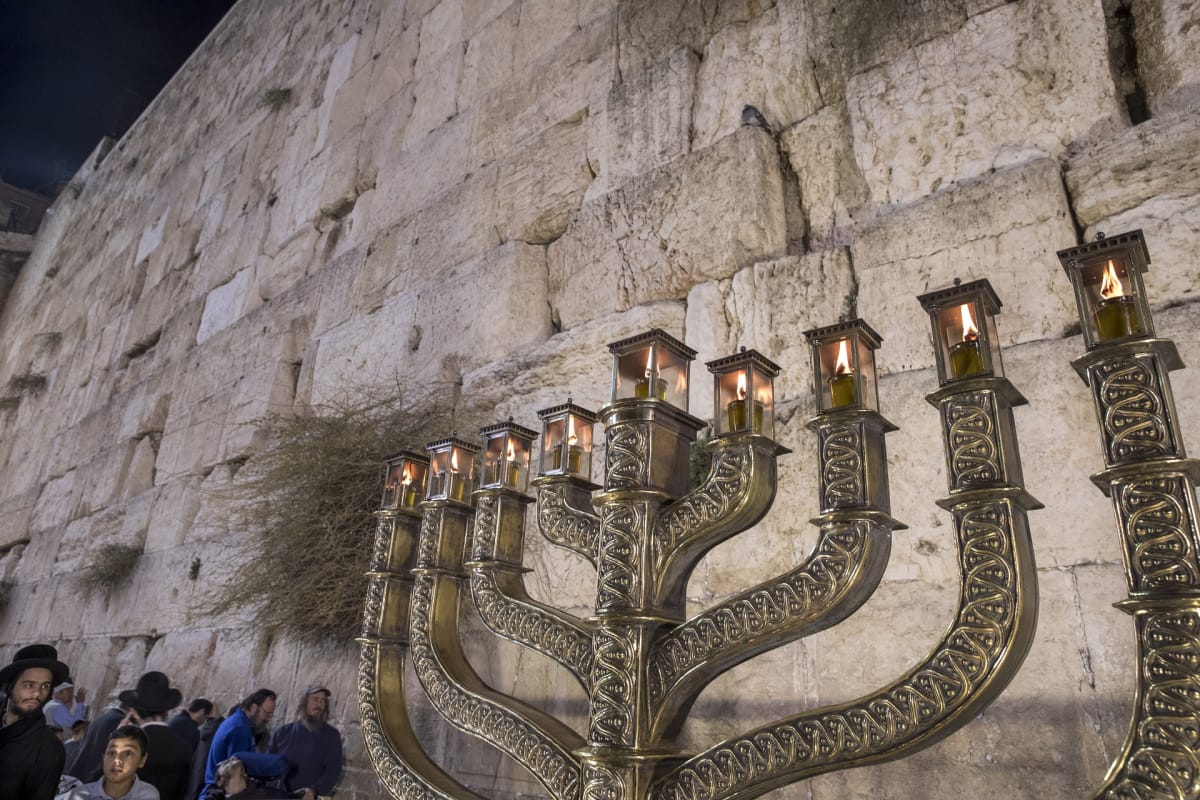
Israel eroaa Unescosta
Lauantai 30.12.2017 klo 10.39




